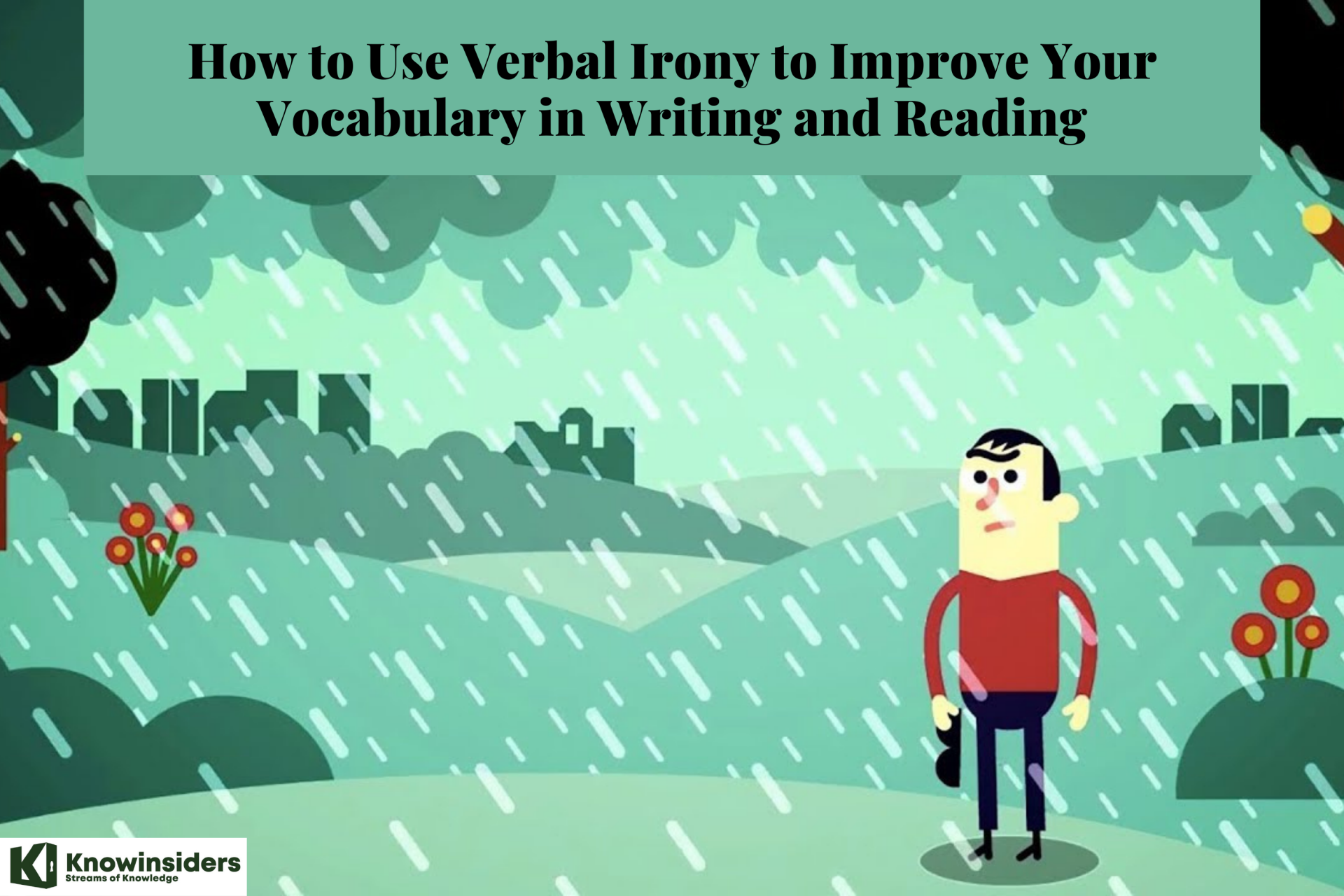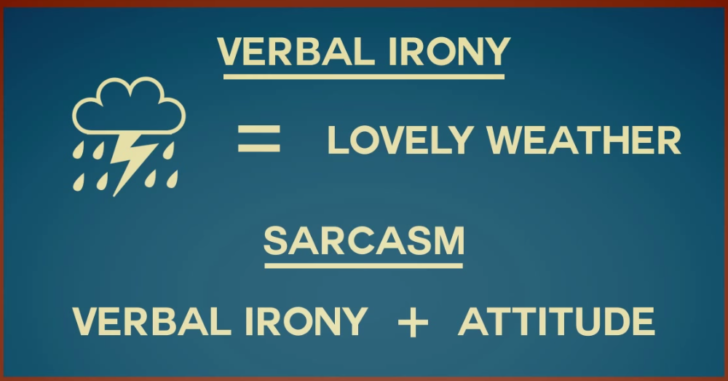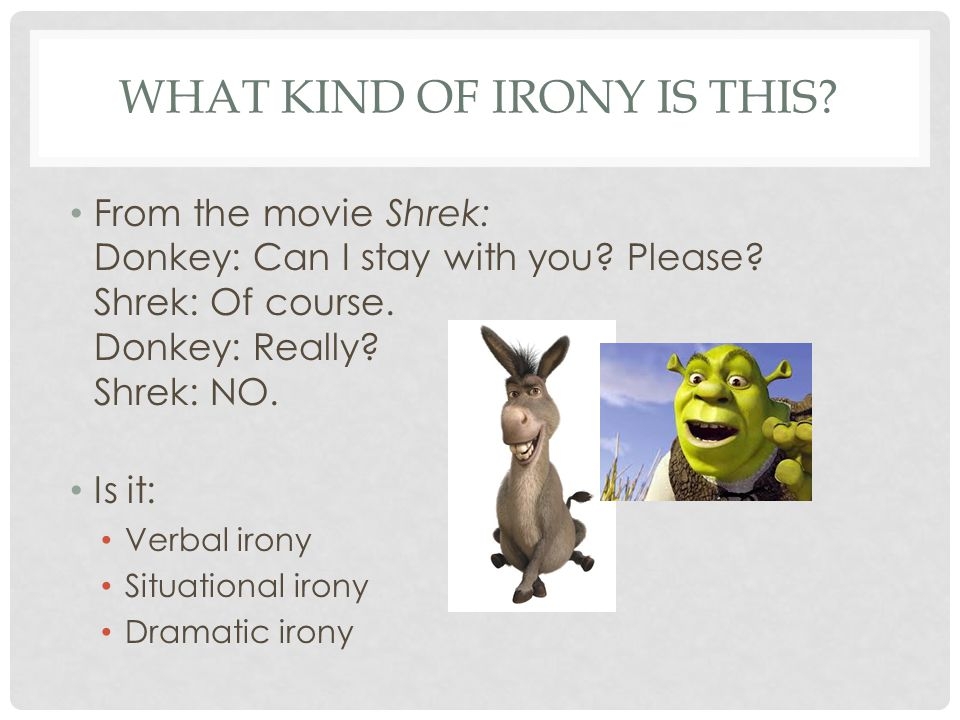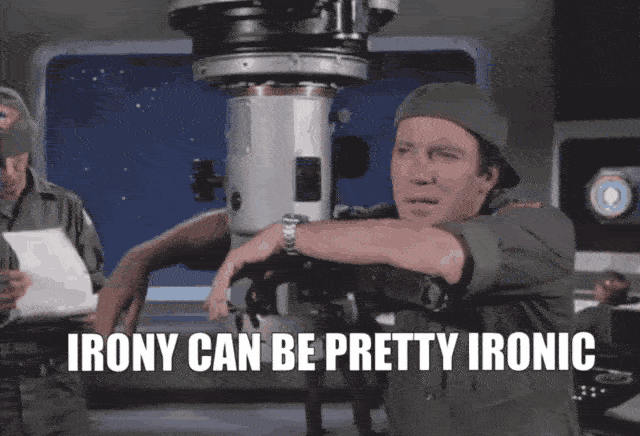How to Use Verbal Irony to Improve Your Vocabulary in Writing and Reading
 |
| How to Use Verbal Irony to Improve Your Vocabulary in Writing and Reading |
There are numerous types of irony in literature, movies, and plays. One of the most common examples of irony is verbal irony. Verbal irony is frequently referred to as a figure of speech. Verbal irony takes place when a character says something that is the exact opposite of what will happen.
There are numerous reasons why someone may use verbal irony in their work. It can be used to make a joke, point out discrepancies in facts, and completely change the perspective on something that is happening. Some of the best-known writers in the world have used verbal irony and their works to make an important point. If you keep your eyes open, you will probably spot the verbal irony in books you read and movies you watch.
The Origins of Irony
Verbal irony first came into use thousands of years ago, in Ancient Greece. The word "irony" comes from the Greek word eiron, a stock character in ancient Greek comedy who feigns stupidity in order to deceive and defeat the alazon, an incompetent show-off. Both characters pretend to be something other than what they are: the eiron is not actually stupid, while the alazon is not actually capable. This contrast between "what seems to be" and "what is" is the root of all the different kinds of irony.
What is Irony?
Irony is when there’s a contrast between expectation and reality. It’s a commonly used literary device. Although irony is often used for comedy, it works effectively across all genres.
The word “irony” comes from an ancient Greek comic character called Eiron. He was a clever underdog who used his wit to bring down his opponent, the braggart Alazon, by underplaying his abilities. In ancient Greek theater, the eirôn became a stock character in comedy.
The original meaning of irony as a literary device meant “dissimulation” and “purposely affected.” Characters said less than they meant in a subtle underplaying of the truth. The meaning has changed over time and now irony means the opposite of what is expected.
Types of Verbal Irony
Verbal irony is used in a variety of circumstances. We may stumble upon it in general conversation, the media and in literature. Verbal irony often brings levity to a situation, exposes double entendres or pokes fun at a situation.
Many people believe verbal irony to be synonymous with sarcasm, but sarcasm is only one of the common types of verbal irony. It appears in four basic forms:
- sarcasm (saying “Oh, fantastic!” when the situation is actually very bad)
- Socratic irony (pretending to be ignorant to show that someone else is ignorant: "I'm confused, I thought your curfew was at 11. Isn't it past 12 now?")
- understatement (saying "We don't get along" after having a huge fight with someone)
- overstatement (saying "I'll die if I can't go to the concert!")
Like the other major types of irony, verbal irony plays with the listener's expectations. You'll find examples of verbal irony everywhere, from children's movies to classic literature to everyday situations.
Verbal Irony vs. Sarcasm: What’s the Difference?
 |
| Photo: crafty.house |
It’s easy to conflate verbal irony with sarcasm, but the two are not quite equal. Sarcasm is a more abrasive type of intentional insincerity. For instance, if someone is openly bitter but proclaims, "I'm so happy for you," their words come from a place of clear, sarcastic intent. Verbal irony can be sarcastic, but it’s generally more benign. When a musician playing an ambitious piece of music calls it a “tune,” they probably aren't trying to be snide; rather, they are using the technically incorrect term to speak of the composition in a casual or humorous way, highlighting its complexity through irony.
Verbal Irony vs. Socratic Irony: What’s the Difference?
Socratic irony refers to an interrogation technique used by the ancient Greek teacher and philosopher Socrates. As documented by Plato, Socrates would feign ignorance of a subject and ask seemingly innocent—but actually leading—questions to draw out information he already knew. Socratic irony differs from verbal irony because it involves intentional deception. On the other hand, verbal irony does not connote insincerity or deception.
3 Examples of Verbal Irony in Literature
We can observe the rich use of verbal irony in film, theatre, and other dramatic arts. Each of these films contains myriad verbal irony examples:
- Julius Caesar by William Shakespeare (1599): In one famous scene of this Shakespeare play, Mark Antony notes that "Brutus is an honorable man" despite well knowing that the story's main character Brutus could be tied directly to Caesar's assassination. His words do not reflect his true feelings.
- A Modest Proposal by Jonathan Swift (1729): Swift’s entire essay is built around verbal irony, satirically presenting cannibalism as a reasonable method of making the children of poor families “beneficial to the public.” Of course, his real intent is to critique the kinds of social engineering that dehumanize the poor and working class.
- Pride and Prejudice by Jane Austen (1813): When Mr. Darcey first sees Elizabeth Bennet, he says, “She is tolerable but not handsome enough to tempt me.” This is ironic because the opposite ends up being true.
Verbal Irony in Literature and the Media
 |
| Photo: slideplayer |
Whenever a character says something that makes you smirk or chuckle, they're probably using verbal irony. It's the difference between what they're saying and what they mean that brings humor to a situation — even to a dark situation.
- In Beauty and the Beast, Belle tells Gaston, "I just don't deserve you!" when, in reality, Gaston doesn't deserve Belle.
- In Shrek, Donkey asks Shrek if he can stay with him. Shrek replies, "Of course," when he really means, "No, not really."
- Stanley Kubrick threw in a little verbal irony in Dr. Strangelove when this line made it into the script: "Gentlemen! You can't fight in here! This is the war room!"
- In Jane Austen’s Pride & Prejudice, Darcy says his future beloved wife is, "tolerable but not handsome enough to tempt me." (Little did he know, right?)
- In J. K. Rowling’s Harry Potter and the Order of the Phoenix, Harry says, "Yeah, Quirrell was a great teacher. There was just that minor drawback of him having Lord Voldemort sticking out of the back of his head!”
- In Lemony Snicket: The Unauthorized Biography, Snicket offers up a great use of verbal irony, "Today was a very cold and bitter day, as cold and bitter as a cup of hot chocolate."
Why Do Writers Use Verbal Irony?Verbal irony is a device that can be used for almost any purpose. Writers use irony:
Verbal irony always requires some interpretation on the reader's part, since the non-literal meaning of what's been said has to be inferred based on context, so irony could be said to involve a certain level of "audience participation"—a fact which adds to the element of entertainment. In other words, verbal irony is often delivered with a figurative "wink and a nod" that suggest, "I know you understand what I mean." Like all kinds of irony, verbal irony rides on the tension between appearances and reality, and so it can also serve to highlight differences in the perspectives of different people and characters. |
How to enhance verbal irony in vocabulary in writing and reading?
 |
| Photo: splashlearn |
Different types of verbal irony statements can be made with the discretion of the speaker/ writer, but there is no one formula.
All we need to do is – look at the situation in a creative way, think out of the box and set our imagination loose. You will notice yourself looking at situations that can be described to listeners/ readers, in a way that they might feel they were a part of the experience themselves! Having people empathize with you can be something that happens at the snap of your fingers.
Such intentional deviation from ordinary language is almost always appreciated since it offers a fresh frame of reference.
Communicate with verbal irony to express yourself, help children learn to read between lines, and draw conclusions from sentences that might not always make sense in their original format.
How to Write Verbal Irony: Simple Tips For Writing Irony
- Pay attention. As you read and watch movies, think critically about what is ironic, and why. For example, in the film The Wizard of Oz, the great and powerful Oz turns out to be just a regular man, while Dorothy, who has been desperately seeking his help so that she can get home, has had the power to return home all along. Think about ways in which you can incorporate situations like this into your writing, where you subvert the expectations of your characters, your readers—or both.
- Use an omniscient point of view. Many novels written in the nineteenth century are told from an omniscient point of view. When a reader knows more than the character, as in Bram Stoker's Dracula, it generates suspense, because your reader waits for the character to learn what they already know. But you might want to invert that balance of knowledge and make the narrator a character in the story that knows more than the reader. Agatha Christie used this first-person strategy to create narrative irony.
- Have a clear point of view strategy. Point of view strategy is deeply bound up with what story you want to tell and will guide how that story unspools. No matter where you are in the drafting process, devote some time to thinking through the risks and rewards of different point-of-view strategies and consider who in your story may be best suited to hold the narrative reins.
- Use the “meanwhile” device. If you are using an omniscient narrative point of view strategy, your narrator may recount a parallel event happening simultaneously in another place using the “meanwhile” device (e.g., “Meanwhile, across town...”). Because this device lets the reader in on happenings that one character has no knowledge of, it is a great tool for generating dramatic irony.
- Use a flashback sequence. When your narrative or characters recall a long memory from a time before the story began, you may want to pull the reader back into a past scene. This is called a flashback. It important to mark the beginning and end of a flashback to make your time jumps clear to the reader, which you can do using past perfect tense to introduce the change—e.g. “he had gone to the marina.” Past perfect tense uses the verb “to have” with the past participle of another verb (in this case “gone”). After a few lines of this, transition into simple past tense—e.g. “he climbed onto the boat.” Generally speaking, using past perfect for a long section of text is jarring for most readers. It’s enough to use it only at the start of the flashback before switching to simple past tense. At the flashback’s end, use a reminder that the reader is back in the current scene.
What Is The Difference Between Situational Irony And Verbal Irony?Situational irony takes place when the character is getting ready for something to happen, but the opposite takes place. Verbal irony takes place when the character says something that is the opposite of what is actually happening. Both types of Irony can be used effectively in literary works. What Is The Effect Of Verbal Irony?Verbal irony is similar to a figure of speech or sarcasm. This can help the reader learn more about the personality of the character. If a character uses verbal irony, it may indicate they have a sense of humor, quick wit, or even lie about something. |
 How to Cure Insomnia with Natural and Simple Ways How to Cure Insomnia with Natural and Simple Ways Insomnia is a common condition, especially among office workers. This is not a disease and cannot be treated with medication. |
 How To Write A Dissertation? How To Write A Dissertation? When writing a dissertation, many professionals want to know, planning to get a degree or improve their professional qualifications. |
 How to Learn to Accept Things and Let Go for Happiness - Life Lesson How to Learn to Accept Things and Let Go for Happiness - Life Lesson Life Lesson - Being active is a good thing but sometimes in life you also need to learn to accept things and let go. One ... |























